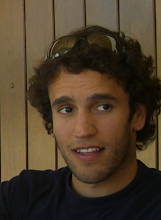This blog as long turned into a day-to-day logbook. Small things that happen either to me or in my "neighborhood" are posted here. I've noticed however, that at the academic level there has been very few posts. The reason is simple: I've been trying to avoid scaring my readers away. I would like to keep this a light-reading blog. By posting University-related stuff I run the risk of loosing a few of my faithful readers. Any event, here are a couple of academia-related stuff.
As I mentioned a couple of months back, I've completed my departmental phd exam in January. This means that the curricular part of my program is done. However, I'm still free to take other courses in order to broad my horizon. This was exactly what I've done in the Spring quarter. I enrolled in the "Stochastic Processes" class from the Math department (MATH 285). Challenging stuff I must say, but fortunately, everything turned out good for me. This covers Markov Chains, passing thru Martingales (fair-game betting strategy) and Brownian Motion, and culminating in Stochastic Calculus. All these topics are interesting in their own right, but this new branch of Calculus (Stochastic) is particularly interesting as well as complicated. I'll not go into detail for several reasons. One, and most important, I don't have the knowledge to do so :) ... but in some generic way this is "just" another branch of Calculus.
In introductory classes for any engineering degree, students usually have their first encounter with Calculus thru the Riemannian integral. The fundamental theorem of calculus is usually enough to understand the practical implications/applicability of such tool. A more rigorous definition of integration is given by the Lebesgue integral, usually covered on more deep theoretical material involving measure theory. Those of us that studied this subject, recall to be taught, at some point, that integration applies only to functions that are "smooth" or differentiable. It turns out this is not the case. Stochastic Calculus has two key distinctions from vanilla-flavored Calculus: it deals with the integration of random variables, and does so over non-"smooth" random functions. Rather than integrating over time or space like we used to, we integrate over random processes that are known to be nowhere differentiable. In the discrete case this is like summing a random variable over a Random walk. In the continuous case this can be seen as integrating over a Brownian motion.
We have only briefly touched this subject, has there was a lot of material to cover to fully understand it. It is a somewhat recent subject, and some of the most important results are due to a Japanse Mathematician named Kiyoshi Itô. Of paramount importance in mathematical finance Itô's integral allows us, under certain conditions, to obtain a closed form solution for integrals over a Brownian motion. I'll post parts of my last homework as a hands-on exercise for the interested reader :)
segunda-feira, 27 de junho de 2011
quarta-feira, 15 de junho de 2011
A Festa
San Diego's Portuguese community holds an annual festival denominated "Festa do Espírito Santo". It's the oldest ethnic festival in the surroundings, having celebrated it's 1st century just last year. This is a mobile fest that coincides with Catholic's Pentecost. "A Festa" as it is commonly known around here is sponsored by one family from the União Portuguesa Sociedade do Espírito Santo (U.P.S.E.S.).
For one week UPSES hosts several events, with it's highlight in last Sunday's parade.
Food, drinks, traditional dancing are all part of the menu.
For one week UPSES hosts several events, with it's highlight in last Sunday's parade.
Food, drinks, traditional dancing are all part of the menu.
Subscrever:
Comentários (Atom)
















